Michelle DePass learned about the value of walkable neighborhoods from her grandmother, who taught her from a very young age that if she wanted a reliable way to get around she better take care of her feet and shoes. “My brother asked my grandmother one time, ‘Where is the car?’ and she pointed [at his feet] and said, ‘Right there. There’s your car.’ I just remember my grandmother taking care of her feet really well. That was her mode of transportation,” DePass shared with me on Monday during a conversation in Peninsula Park.
DePass is running for a seat on Portland City Council to represent District 2 (north and northeast), and she figures she’ll wear through two pairs of shoes walking and knocking on doors to convince voters to send her to city hall. She knows the district well not just because her family has been a part of it since the 1940s (her parents met at Dawson Park), but also through her role as chair (and currently vice-chair) of the the Portland Public School Board. In addition to that elected position (which she’s held since 2019), DePass works as a climate change analyst at the City of Portland Bureau of Planning & Sustainability.
Our chat in the park came 13 years after DePass stood up during a meeting of the North Williams Avenue Traffic Safety Project and expressed concerns that the process and plans for a new bike lane was severely misguided because the people pushing for it were clueless about the lived experience of Black Portlanders and the historical context of the neighborhood. “That was an example of my leadership,” DePass shared when I brought up that meeting. “We were literally in the hospital where I was born talking about that project. And I just thought, I studied this in school, there’s an intersection between race and transportation.”
Her voice not only altered the course of the Williams Avenue project, but had a vast influence on bike planning and advocacy in Portland in general. It was the first of many difficult, yet important, lessons Portland’s bike advocacy community would be forced to confront in the years to come. And it was just one of many topics we covered in this interview.
Here are some excerpts:
On her job as leader of PPS Board and how it will translate to city council:
“The school board is the toughest political job in Oregon. It’s really, really challenging. When I was the chair we had to engage the police in protection. We’ve had to beef up security… And then it’s also tough because you have to make decisions with at least three other people. So I think that the experience I bring is in decision-making. In a shared decision-making model your ability to be effective depends on how well you relate with other people, you have to be able to sell your idea and you have to be able to have someone else tear it down and say ‘That’s good, but I’d like to tweak it.’ … I have the ability to have a difficult conversation. I don’t get too emotional about it. But I do have a strong sense of right and wrong.”
On the concept of ‘school streets’ (making streets safer in front of schools):
“I’m 125% in favor of it. And in fact, last year, I started to broach this idea… I’m having coffee with somebody and saying, ‘You know, you’re gonna say no, but I have this great idea: What would it look like if I could get all the resources, including a free pilot, to take a look at our school campuses and see which ones we could put mechanical bollards up at either end of the street, to keep cars out to keep it active for parents and children?’… I can envision it. I don’t know which schools they would be at, but it’s something that I want to advocate for.”
On carfree Last Thursday street fair on NE Alberta St:
“I love that. And I love riding [my bike] on Alberta, because I just feel like a 12-year old whenever I ride down Alberta because I’m like, ‘Yeah, there’s no bike lane. And it’s just, you know, I got this!’ I don’t ride long stretches, I have a helmet on, and I’m very, you know, I can be aggressive. I can take a lane. I’m not afraid of doing that. It’s my street as much as anybody else’s. And I feel like I’m entitled to it when I’m on it.”
Asked to name a transportation issue in her district that needs attention, she mentioned I-5 through the Rose Quarter. She said she supports the highway caps, but when pressed to say whether or not she supported ODOT’s plans to widen the freeway, I didn’t hear a clear answer.
On the freeway itself:
“There’s a freeway that runs through the district that is a scar… like in many communities around the country, it goes through the most vulnerable neighborhood and gets built and it tears the community apart.”
You support the caps, but do you support ODOT’s plan for the freeway elements of the project?
“Not necessarily.”
Do you trust ODOT and the freeway elements of it?
“That’s a great question. And I was expecting that question coming from you. I think we’re looking at it as an either/or situation; but I’m always interested in finding out what the hybrid looks like. And that’d be something I would be willing to explore.”
Do you think ODOT’s current plans for the freeway will make climate change consequences worse?
“Oh yeah. It will absolutely.”
In this exchange, DePass shared how her style is to build relationships with people she’s critical of and discuss issues privately, instead of rabble-rousing in public:
“I know people that are working on that project that are decision makers, and we have a relationship so that I can push, push, push, push, push. And that seems to be effective for me. The activism part of me is gone. That part, the fighting piece, is gone because that hasn’t been effective and I want to be the kind of activist that’s extremely effective. I found that standing on the side and screaming, that’s our right to do that, but it’s also not very effective. So I would use my power — I have a position of power right now — and I’d like to use that to have the conversations offline that make change. Nobody sees those conversations except for me. But that’s how I’ve been effective on the School Board… taking things out of the public realm and having a one-on-one conversations to make change.”
Learn more about DePass and her campaign at DePassforPortland.com or follow her on Instagram.
— Listen to the full episode in the player above or wherever you get your podcasts.



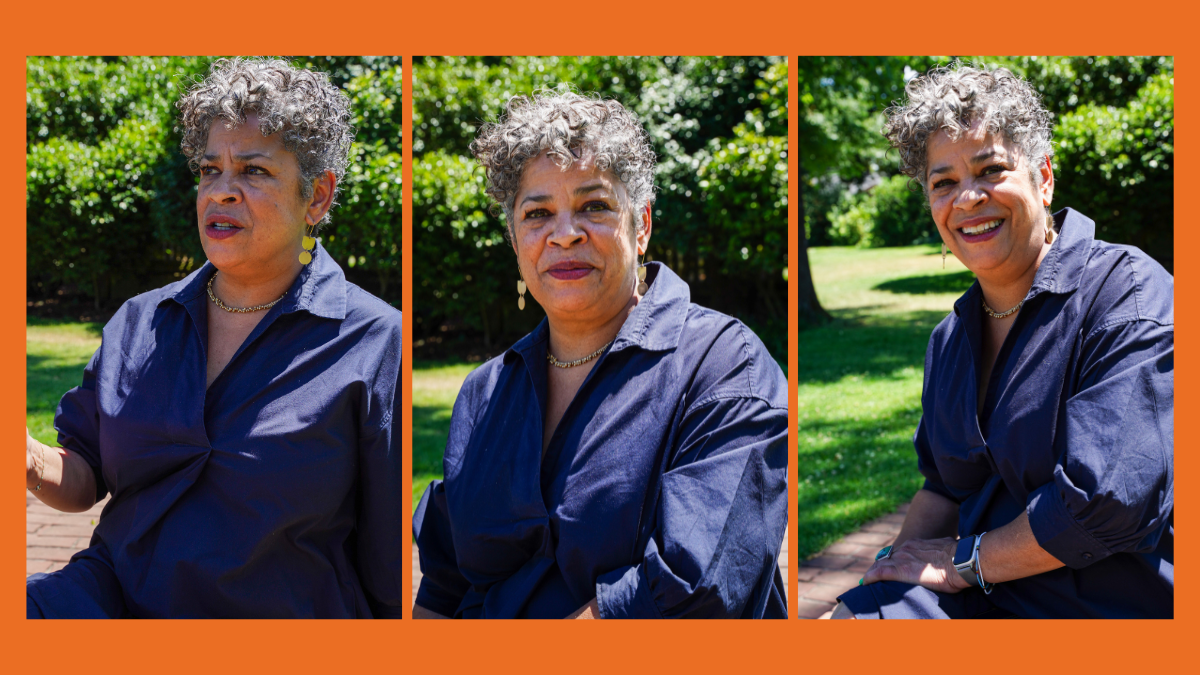
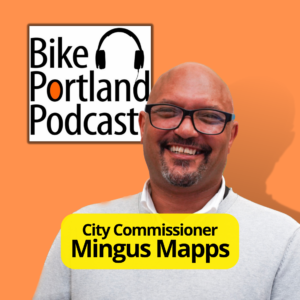
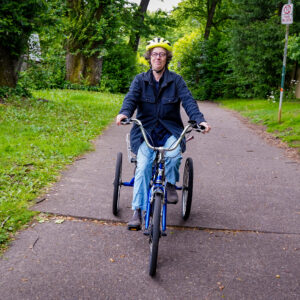
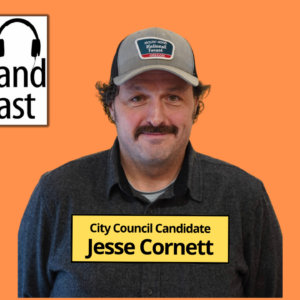
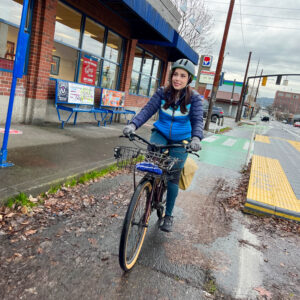
Thanks for reading.
BikePortland has served this community with independent community journalism since 2005. We rely on subscriptions from readers like you to survive. Your financial support is vital in keeping this valuable resource alive and well.
Please subscribe today to strengthen and expand our work.
Maybe I missed it but I wish there had been a conversation regarding her being a leading voice in blocking important N Portland bike projects such as the N Williams bike lanes and her implication at the time was that
– cycling was for white elites
– that bike lanes represented gentrification and by extension racism
– how her opinion has or has not changed over the last 13 years?
– Does she still think bike lanes are racist?
– Does she still think cyclists are just white gentrifying elitists?
Hi Jay,
Given that she talked at length about how she likes the Williams bike lanes and she rides on them and many other bike lanes around town herself, it’s clear to me she is a supporter of bicycling and bike lanes.
And no, you didn’t miss anything. I didn’t ask her those questions. I agree that some of her statements in the past (and maybe even present, I don’t know if she’d still say them) were unfortunate and it would have been interesting to hear her speak to some of them.
Great interview. Michelle is a dedicated, long-time community leader and public servant. I am glad she is running. But I have some questions regarding her interest in convening conversations to move things forward and tackle tough issues. How does she plan to create the circumstances- on an ongoing basis- that will draw enough people (and the fullest diversity of people possible) into meaningful conversations if there isn’t something immediately at stake? How do you create the circumstances where people can authentically exercise their individual and collective power together to directly shape outcomes in their City? The 2011 Williams Avenue Traffic Safety Project created those circumstances. But what decision making policies would Michelle advance to make these circumstances- of Portlanders directly exercising power- a recurring possibility? Without more specifics, I would be concerned we’d be having conversations disconnected from real power, involving people with the time and resources to participate, and at high risk of leaving people feeling like they wasted their time. I am sure that is NOT what she advocating but I need more concrete proposals as to how she hopes to actualize what she is saying she wants for Portland.